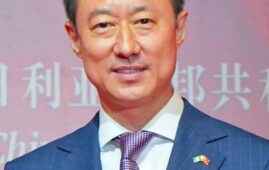By Dong Yifan
The G20 Extraordinary Virtual Leaders’ Summit on COVID-19 was held on Thursday. It was the first G20 summit to take place via video link. Chinese President Xi Jinping delivered a speech titled “Working Together to Defeat the COVID-19 Outbreak,” calling for an all-out global fight against the COVID-19 outbreak.
G20 summit provides a significant platform to advance initiatives, and also highlight the importance of multilateralism and global cooperation. China has made great achievements and accumulated valuable experience in fighting the virus. As a defender of the international order and multilateralism, the country will play a leading role in this global war against the pandemic.
Conforming to economic globalization and the shift in global political and economic influences, the G20 is a multilateral institution in global governance. Its members account for 85 percent of global GDP, two thirds of the world’s population, and 75 percent of international trade. Now, the focus of G20 is not limited to economic stability but has expanded to a wider range of issues. This year, the COVID-19 pandemic is raging across the world, posing a grave threat to global economy and financial market. No single country will be able to deal with the pandemic and its impact on the economy. Adhering to multilateralism and making concerted efforts is the only way to survive the pandemic.
Compared to other G20 members, China has had few new cases of local transmission for several consecutive days. European countries and the US are now being hit hardest. Japan, which was forced to postpone the 2020 Tokyo Olympics, is also grappling with the virus and the situation in South Korea is not optimistic. Countries in Africa, Latin America, the Middle East and South Asia need global cooperation to prevent massive outbreaks. Under the present circumstances, this summit addressed the biggest concerns of all countries in a timely manner. The novel coronavirus has brought pressure and uncertainty to global economic and financial governance. Manufacturing and service industries in many countries have plummeted. Circuit breakers were triggered four times in the US stock market and the international oil market has also seen volatility. Developed countries have adopted ultra-loose fiscal and monetary policies to boost confidence. All these changes call for strengthening coordination to tackle the unprecedented challenges.
Xi’s participation in the G20 special summit demonstrates China’s dedication to working with the rest of the world. It also conforms to China’s vision of building a community with a shared future for mankind. In this war against the COVID-19, China has made many contributions.
First, China took the lead in overcoming the virus and easing the global situation. 1.4 billion Chinese people worked together and succeeded in curbing the spread of the virus. This has reduced pressure and risks for other countries. Additionally, China’s valuable experience in fighting the virus is helpful for other parts of the world grappling with the same disease. China is also providing political and material support for other countries.
Second, China’s market and Chinese manufacturing remain stabilizers in the global economy. At present, the global economy is facing contraction in both supply and demand. As China gradually resumes work and production, there will be an explosive rebound in demand. This will in turn effectively stimulate exports and stabilize commodity prices.
Together with India, China accounts for 70 percent of global antibiotic production. With its current production capacity, China is able to provide anti-epidemic materials like masks and ventilators to support other countries.
COVID-19 is the enemy of all people and one of the greatest non-traditional security challenges and economic risks ever faced. No country can stand alone in this storm. Shifting responsibility will not solve problems but intensify conflicts. Only through cooperation and practical actions can we overcome our difficulties together.
The author is a research fellow with the Institute of European Studies, China Institutes of Contemporary International Relations.
Source:Global Times










Leave a Comment